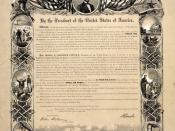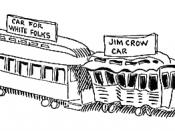The ratification of the thirteenth, fourteenth, and fifteenth amendments prompted the beginning of a new era for Negro men and women. The intent of the constitutional additions were to create an environment in which the black man could live in equality with the white man. This was not the case. While the amendments provided a starting point for political equality, the social inequality was raised to a more distant level. Further, state legislation served as a check to the constitution. No longer was the need for slavery the rationale behind labeling blacks as inferior. A new mentality of discrimination based on ignorance and hatred was established. It was this mentality that actually decreased racial equality.
'Aye, the very fact that the Negro has been used to defeat this rebellion and strike down the standards of the Confederacy will be a stimulus to all their hatred, to all their malice, and lead them to legislate with greater stringency towards this class than ever before.'1
Abraham Lincoln created a new war effort in the later stages of the Civil War. Previously the war was labeled as a 'war to save the Union.' To put pressure on the South he passed the Emancipation Proclamation, changing the war to an effort to free the slaves. The conclusion of the war brought the South to believe that blacks were the ultimate reason for the Southern failure. Enter ignorance and hatred. Racism became a way for the South to lay blame on someone other than themselves. This blame came many forms. The most effective were political and social barriers imposed by those against racial equality. These included Jim Crow laws and methods to promote segregation. In essence the newly emancipated blacks lived in a society that was progressing to a more unequal state.



This essay is not even an essay
all this essay contains is citations from other documents and zero analysis. why would you ever put this essay up?
2 out of 2 people found this comment useful.